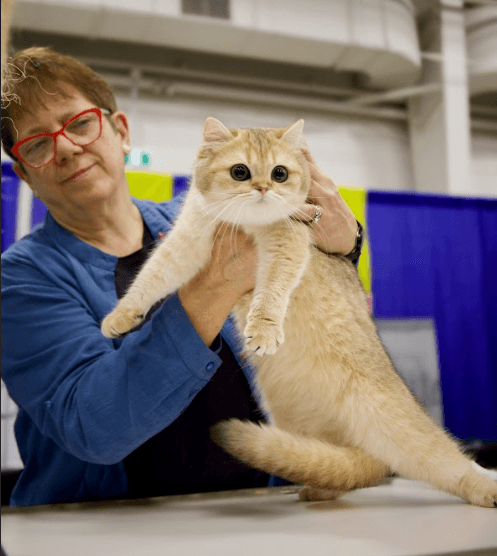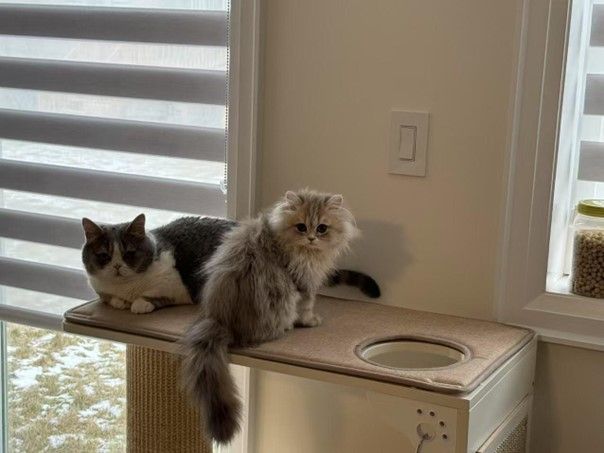Caring for a British Shorthair: Grooming and Care Tips
From: Catking Cattery

Bringing a British Shorthair into your life is a long-term commitment filled with rewards. Known for their dense coats, calm temperaments, and iconic rounded features, British Shorthairs are one of the most popular cat breeds globally. Their care needs are manageable but require consistency and attention to detail. As a trusted British Shorthair cattery Toronto residents rely on, we offer insights to help new and seasoned cat parents give their companions the best quality of life.
Understanding the British Shorthair's Coat
The British Shorthair's plush, dense coat is unlike that of many other short-haired breeds. Their double-layered fur helps regulate body temperature and contributes to their signature teddy bear-like appearance. Although they don’t require the intensive grooming associated with long-haired cats, their coat still needs weekly care to avoid matting and reduce shedding.
Grooming Frequency and Tools
We recommend brushing your British Shorthair once or twice a week with a soft-bristle brush or rubber grooming mitt. This helps remove loose hairs, distribute natural oils, and strengthen the bond between you and your cat. During seasonal shedding periods in spring and autumn, increase grooming frequency to three times per week. Avoid using de-shedding tools intended for dogs or long-haired cats—they can irritate your Shorthair’s skin and damage their coat texture.
Bathing: Only When Necessary
Unlike some breeds, British Shorthairs don’t require frequent baths. Cats are generally self-cleaning, and overbathing can strip their skin of essential oils. If your cat gets into something messy or has a skin condition, use a vet-approved cat shampoo and lukewarm water. Always dry them thoroughly afterward to prevent chills.
Nail, Ear, and Dental Care
Nail trimming should be part of your monthly routine. Use a cat-specific clipper and be cautious not to cut into the quick. Providing scratching posts will also help naturally wear down nails. Check their ears biweekly. Healthy ears are pink and odourless. If you notice wax buildup or a foul smell, consult your vet before cleaning. Dental hygiene is just as important. Research has found that 70% of cats show signs of oral disease by age three. Brush their teeth weekly using a cat-friendly toothbrush and toothpaste.

Nutrition and Hydration
British Shorthairs are prone to weight gain due to their laid-back nature. Choose a balanced, high-protein diet that supports muscle mass while managing calories. Speak with your vet for guidance on portion control and feeding schedules. Hydration is equally vital for this breed. Cats in general aren’t big water drinkers, so keeping them hydrated often takes a little extra effort. Always provide clean, fresh water in multiple locations throughout your home. To boost moisture intake, consider adding high-quality wet food to their daily routine. Not only does this support kidney health, but it also helps with overall digestion and energy levels.
Mental and Physical Stimulation
These cats are known for their easy-going disposition, but that doesn't mean they don't need enrichment. Interactive toys, puzzle feeders, and climbing trees are excellent ways to engage their natural hunting instincts and curiosity. Scheduled play sessions—even short ones—can make a big difference. Use teaser wands, laser pointers, or treat-dispensing toys to encourage movement and brain engagement. Research highlights that environmental enrichment directly improves feline behaviour and reduces stress-related issues.
Health Screenings and Vet Visits
We recommend annual vet checkups and staying up to date with vaccinations and parasite prevention. British Shorthairs are generally robust, but they are genetically predisposed to conditions like hypertrophic cardiomyopathy (HCM) and polycystic kidney disease (PKD). Regular veterinary visits are key to early detection and prevention. Annual wellness exams, up-to-date vaccinations, dental checks, and parasite control should all be part of your care plan. For kittens and young cats, early screening for HCM and PKD can give you peace of mind and help you manage potential risks down the line. Work with a responsible and trusted British Shorthair cat breeder in Canada—like us at CatKing Cattery—to ensure your kitten has been screened for such conditions.
Grooming Routine: Checklist for New Owners
- Brush weekly (increase during shedding season)
- Trim nails every 3–4 weeks
- Clean ears and eyes as needed
- Brush teeth weekly
- Monitor weight and provide balanced meals
- Offer daily play and environmental enrichment
- Schedule regular vet visits
Why British Shorthairs Need Special Attention
As a leading Toronto cattery, we’ve seen many pet parents underestimate the grooming needs of British Shorthairs due to their short fur. Their dense coat needs routine attention to avoid skin irritation or matting. Additionally, their calm nature means they often tolerate grooming sessions better than other breeds, making it an enjoyable experience if introduced early.

Choose CatKing Cattery for Quality and Expertise
If you're searching for a kitten for sale or looking to buy cats in Toronto, we pride ourselves on setting the gold standard. As a top-rated cat breeder Canada trusts, we offer British Shorthair and Longhair cats for sale, backed by ethical breeding practices and lifelong support. Unlike generic listings to buy cats online, our kittens come with health screenings and proper socialization. Whether you’re planning to buy a kitten in Montreal, Vancouver, or Burnaby, know that our legacy as the best cattery in Canada speaks through the quality of our cats. As trusted and respected kitten breeders, our British Shorthair kittens are raised in a loving, professional environment that ensures they transition smoothly into your home. Make a confident choice with a British Shorthair breeder who prioritizes excellence, health, and temperament. Explore our website and reserve your curious companion today, or reach out to our team to learn more.
2025-05-05






